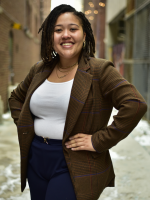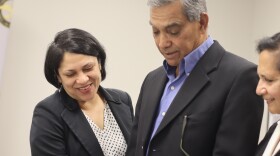Sweet Evening Breeze in Louisville provides housing, health and support resources to LGBTQ+ young adults.
Last month, the organization announced a pause on its free HIV services due to federal funding cuts. President Donald Trump’s federal budget will cut over $1.5 billion for HIV care, treatment, prevention and research nationwide.
Sweet Evening Breeze partnered with Volunteers of America and Target4region5, a statewide HIV/AIDS education resource, to keep the program running for the last four years. Now, some employees are out of work, including VOA outreach and prevention supervisor Lauren Stone.
LPM’s Giselle Rhoden spoke with Stone and Sweet Evening Breeze program manager Stuart Walker about it all. This interview has been edited for clarity and length.

Stuart, Sweet Evening Breeze is among many other organizations nationwide that have been affected by federal funding cuts. How are you feeling now that this pause is in place?
SW: It's just really disappointing to see. On Thursdays, when VOA was there to provide HIV testing, we also had people coming in for therapy and case management. And that's usually how we would catch people and say, “Hey, have you been tested in the last four months? And if so, we're here.” And it wasn't necessarily that people were coming in to get testing. It’s just that we were there and it was convenient. And I think the loss of that is really going to be kind of devastating, because people are not usually thinking about getting an HIV test unless it's right in their face. And now we just, it seems like we just don't have that option.
The HIV services started with me. It was actually the first program we had at Sweet Evening Breeze. It was like my first program. And to see that just go away suddenly when it was a staple for us has been really just devastating, not just because it's taking access to health care away from the community but also because the community partners and the nonprofits in Louisville are really tight-knit. We don't want to see each other lose jobs or money. So it's just really difficult to see on a professional and individual level.
Lauren, you were on staff when this happened. Take me through how you felt when you heard the news?
LS: I felt a lot of ways. Obviously there's the concern for myself and my coworkers about how we're going to continue making money and paying our bills. But, on the larger part, HIV testing is so important to folks in our community, as well as sexual health education. It's a life-saving thing that we do, and so for that to be cut significantly, it was really upsetting. I think without this care, people will lose their lives, and having accessible care is so important. So it's incredibly disappointing that that's been taken away.
We were brought in for a meeting and told that our funding — which is the EHE Grant (Ending the HIV epidemic) — would be paused indefinitely. It was pretty devastating. I wrote to all our community partners that we would no longer be offering services, and I think that's how Stuart ended up finding out, as well as the rest of our community partners in Louisville.
How has the community reacted, especially those that rely heavily on these services?
LS: Everyone has been, obviously, incredibly disappointed. We do have a lot of folks who we see at least once a month to come in and get their free HIV testing. So giving them that news was not an easy thing to do. Having to move something that you are sure was in this space, that was a safe space for you and that you were comfortable going to, especially when talking about HIV, is something that's kind of hard to find. So now, these folks are having to completely start over with that journey.
SW: I think it has also just caused general confusion in the community. Nobody really knows where to go. Not everyone has been cut. Not everyone is fully federally funded. So figuring out who is doing what has been tricky for the community and for community partners, especially since everything kind of happened so fast. So it's kind of left everyone scrambling to figure out, “Where can we send people and what can we do?” So it's just been an intense time for everyone.
What other free HIV testing is available in the community? If any.
LS: From what I know, Target4Health through UK is still out and working hard and doing HIV testing. They also offer a needle exchange service. And then Louisville Metro Public Health is another one where you can get free HIV and Hepatitis C testing as well as a needle exchange service, and that is on 400 Gray St.
Otherwise, Volunteers of America was that organization. This program is actually one of the longer-standing programs at Volunteers of America. Along with our testing, we had those HIV classes teaching folks that HIV is not a death sentence, which is something that a lot of people don't know, and really working through that stigma that comes along with HIV, which is so important. We also were the largest condom distributor in the Louisville area. We have distributed about 10,000 condoms this month. But that service is no longer going to be happening. We also offered Linkage to Care Services. So if someone were to test positive for HIV, my team would direct them to the 550 clinic through [University of Louisville]. We'd be there to sit with them in that appointment if they needed that support, and really answer any questions they could have.
Are you thinking of other ways to bring back these services to the community?
SW: It's our responsibility as an organization or a community partner to kind of take on the educational piece that you know that you all are no longer able to provide. Going forward, we're all just going to have to resource each other and make sure that we're communicating about what is and isn't available. I think, as providers, we can start talking to our clients about some of this education that they're missing.
LS: It's important that everyone knows anyone can get HIV, and it is completely preventable, and there are still resources to get PrEP and PEP and doxypep for free. There are also resources still to get your antiretrovirals, which is an HIV medication. They might be a little harder to find, but they are there. And the biggest piece is, whether personally or professionally, just trying to work against that stigma that comes with HIV. I think a lot of scary things happened in the ‘80s through the HIV epidemic, our communities were left to fend for themselves. In a lot of ways, there was not a lot of governmental assistance, and that's kind of where we're at again. HIV education is life-saving care, and it is important for every person to have access to that.






